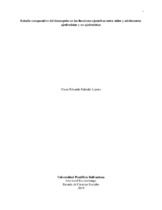Mostrar el registro sencillo del ítem
Estudio comparativo del desempeño en las funciones ejecutivas entre niños y adolescentes ajedrecistas y no ajedrecistas
| dc.contributor.advisor | Mejía Orduz, Manuel Alejandro | |
| dc.contributor.author | Salcedo Lopera, Oscar Eduardo | |
| dc.coverage.temporal | 2019 | |
| dc.date.accessioned | 2021-05-04T21:28:12Z | |
| dc.date.available | 2021-05-04T21:28:12Z | |
| dc.date.issued | 2019 | |
| dc.identifier.uri | http://hdl.handle.net/20.500.11912/8413 | |
| dc.description | 73 páginas | spa |
| dc.description.abstract | El ajedrez es un deporte cognitivo que en su ejecución requiere del empleo de funciones ejecutivas como la planificación, el control de impulsos, la flexibilidad cognitiva y la evaluación de riesgo beneficio. Diversas investigaciones han buscado explorar y determinar los efectos que el ajedrez puede generar sobre los procesos antes mencionados, encontrándose en los resultados de estas investigaciones indicadores de desempeño en pruebas neuropsicológicas que sugieren que el ajedrez puede ser una herramienta que favorezca el incremento del potencial cognitivo en quienes lo entrenan de manera sistemática. Para verificar lo planteado el siguiente estudio que comparo el desempeño ejecutivo de jugadores y no jugadores de ajedrez en pruebas como el Raven y neuropsicológicas como la Torre de Hanoi, el Juego de Cartas de Iowa, el Test de Stroop y el Wisconsin, en una muestra de 60 participantes, 30 ajedrecistas y 30 no ajedrecistas, que estuvo compuesta por 45 participantes masculinos y 15 participantes de sexo femenino. Los resultados encontrados en este estudio identifican un perfil neuropsicológico en jugadores de ajedrez que evidencian un rendimiento ejecutivo superior en tareas que implican planificación, flexibilidad cognitiva, control inhibitorio y evaluación de riesgo beneficio. Por lo que se recomienda impulsar su aplicación en contexto escolar y empezar a estudiar su aplicación en escenarios clínicos con perspectivas orientadas a la estimulación y desarrollo de funciones ejecutivas. | spa |
| dc.description.abstract | Chess is a cognitive sport that in its execution requires the use of executive functions such as planning, impulse control, cognitive flexibility and risk benefit assessment. Several investigations have sought to explore and determine the effects that chess can generate on the aforementioned processes, finding in the results of these investigations performance indicators in neuropsychological tests that suggest that chess can be a tool that favors the increase of cognitive potential in who train it systematically. To verify the above, the following study comparing the executive performance of players and non-chess players in tests such as Raven and neuropsychological tests such as the Tower of Hanoi, the Iowa Card Game, the Stroop Test and Wisconsin, in a sample of 60 participants, 30 chess players and 30 non-chess players, which was composed of 45 male participants and 15 female participants. The results found in this study identify a neuropsychological profile in chess players that show superior executive performance in tasks that involve planning, cognitive flexibility, inhibitory control and benefit risk assessment. Therefore, it is recommended to promote its application in a school context and begin to study its application in clinical settings with perspectives oriented towards the stimulation and development of executive functions. | eng |
| dc.format.mimetype | application/pdf | |
| dc.language.iso | spa | |
| dc.publisher | Universidad Pontificia Bolivariana | spa |
| dc.rights | Attribution-NonCommercial-NoDerivatives 4.0 International | * |
| dc.rights.uri | http://creativecommons.org/licenses/by-nc-nd/4.0/ | * |
| dc.subject | Niños | spa |
| dc.subject | Adolescentes | spa |
| dc.subject | Ajedrez | spa |
| dc.subject | Rendimiento | spa |
| dc.subject | Neuropsicología | spa |
| dc.subject | Escolar | spa |
| dc.title | Estudio comparativo del desempeño en las funciones ejecutivas entre niños y adolescentes ajedrecistas y no ajedrecistas | spa |
| dc.type | Trabajo de grado | spa |
| dc.publisher.department | Escuela de Derecho y Ciencias Políticas | spa |
| dc.publisher.program | Derecho | spa |
| dc.type.hasVersion | publishedVersion | spa |
| dc.description.sectional | Bucaramanga | spa |
| dc.description.degreename | Abogado | spa |
Ficheros en el ítem
Este ítem aparece en la(s) siguiente(s) colección(ones)
-
Trabajos de grado [6439]
Monografías, artículos, informes, proyecto de grado


